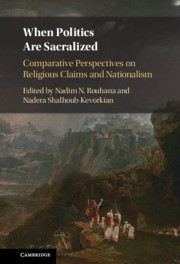Book contents
- When Politics Are Sacralized
- When Politics Are Sacralized
- Copyright page
- Contents
- Figures
- Maps
- Tables
- Contributors
- Preface and Acknowledgments
- 1 A Comparative Perspective on Religious Claims and Sacralized Politics
- Part I Israel
- Part II India
- Part III Sri Lanka
- Part IV Serbia
- Part V Iran
- Part VI Saudi Arabia and Wahhabism
- Part VII Northern Ireland
- 12 Protestantism and Settler Identity
- 13 Does Religion Still Matter?
- Part VIII Palestine
- Index
- References
12 - Protestantism and Settler Identity
The Ambiguous Case of Northern Ireland
from Part VII - Northern Ireland
Published online by Cambridge University Press: 10 June 2021
- When Politics Are Sacralized
- When Politics Are Sacralized
- Copyright page
- Contents
- Figures
- Maps
- Tables
- Contributors
- Preface and Acknowledgments
- 1 A Comparative Perspective on Religious Claims and Sacralized Politics
- Part I Israel
- Part II India
- Part III Sri Lanka
- Part IV Serbia
- Part V Iran
- Part VI Saudi Arabia and Wahhabism
- Part VII Northern Ireland
- 12 Protestantism and Settler Identity
- 13 Does Religion Still Matter?
- Part VIII Palestine
- Index
- References
Summary
This chapter addresses the ambivalent relation of Irish Protestantism to settler identity in the post-1922 period. In the Republic, Irish Protestants accommodated to the new state and majority Catholic government; in Northern Ireland, “a Protestant state for a Protestant people” took on the forms of a settler-colonial state. Protestant supremacy expressed itself in triumphalist cultural forms and in legalized and informal discrimination against Catholics. Northern Ireland offers a “laboratory” for the formations of the settler colony that clarifies the tendencies of settler-colonial entities: the necessary supremacism or racism, the sectarianization of working-class allegiances, the disproportionately violent response of the state to the demand for rights, and the necessity for the withdrawal of “mother country” support for a peace process to begin. Northern Ireland highlights how settler mentalities are the effect of a structure of dominance, not an unchangeable given. Analogies with Palestine/Israel are frequently invoked and the Northern Irish peace process might suggest a just way to end Israel’s colonization of Palestine. Northern Ireland indicates that the entrenched structures of racial or ethnic supremacy in settler-colonial societies are not necessarily permanent or endemic, but capable of transformation if relations of domination are dismantled.
Keywords
- Type
- Chapter
- Information
- When Politics are SacralizedComparative Perspectives on Religious Claims and Nationalism, pp. 309 - 336Publisher: Cambridge University PressPrint publication year: 2021
References
- 5
- Cited by



